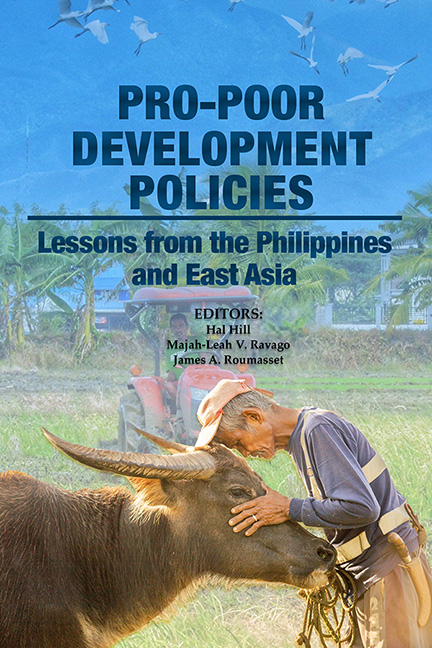Book contents
- Frontmatter
- Dedication
- Contents
- Figures, Tables and Boxes
- Foreword
- Foreword
- Message
- Preface and Acknowledgements
- About the Editors
- About the Contributors
- Acronyms
- Part 1 Introduction and Synthesis
- Part 2 Agricultural and Economic Development
- Part 3 Economic Policies for Achieving Targeted Levels of Living in the Philippines
- Part 4 Inequality and Economic Development
- Part 5 Competition Law and Policy
- Part 6 International Dimensions
- Index
25 - International Cooperation for Development: Learning from Trade and Tax Policies
Published online by Cambridge University Press: 09 January 2024
- Frontmatter
- Dedication
- Contents
- Figures, Tables and Boxes
- Foreword
- Foreword
- Message
- Preface and Acknowledgements
- About the Editors
- About the Contributors
- Acronyms
- Part 1 Introduction and Synthesis
- Part 2 Agricultural and Economic Development
- Part 3 Economic Policies for Achieving Targeted Levels of Living in the Philippines
- Part 4 Inequality and Economic Development
- Part 5 Competition Law and Policy
- Part 6 International Dimensions
- Index
Summary
INTRODUCTION
Effective international cooperation can bring enormous benefits to developing countries, such as by providing access to markets and facilitating technology transfer and investments for development. With much deeper global economic integration, there is an even greater need for coordinated policy actions by countries to avoid beggar‑thy‑neighbour policies and adverse spillovers and, instead, create conditions to lift global welfare. Achieving international cooperation that serves development, however, is not always forthcoming nor easy to promote in existing international forums. A key challenge for policymakers in developing countries is to extend their attention beyond implementing national policies to also finding the means to influence support for international measures that serve their respective countries’ interests.
This paper explores the interplay of national policies and international regimes in the areas of trade policy and corporate tax policies to illustrate how international cooperation has shaped their impact on development. It draws on the substantial body of analytical work on these areas to highlight some key challenges faced by developing countries in reflecting their interests to influence international rules and practices. The first part discusses lessons from the rules-based international trading system. The second part reflects on the challenges of reforming the international corporate tax system, especially from the perspective of developing countries. The third part considers other policy areas where international cooperation will be important for developing countries.
LESSONS FROM A RULES-BASED INTERNATIONAL TRADING SYSTEM
The textbook economic case for international trade—the law of comparative advantage—says that two or more countries can gain from specialization and trade of goods. Free trade also offers dynamic benefits, such as from the pressure on companies to be more productive to be able to compete internationally. History shows, however, that countries also have incentives to limit imports to protect local production in specific sectors, gain terms of trade advantage and/or raise fiscal revenues. Countries have used trade agreements as mechanisms to seek reciprocal commitments to reduce barriers to trade and provide greater access to markets.
Evidence shows that the world has benefited from the rules-based international trading system.
- Type
- Chapter
- Information
- Pro-poor Development PoliciesLessons from the Philippines and East Asia, pp. 727 - 749Publisher: ISEAS–Yusof Ishak InstitutePrint publication year: 2022

